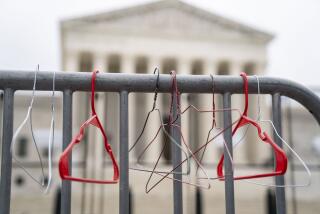Alito’s moment
SUPREME COURT nominations are as old as the republic, but the modern history of the battles over court appointments begins in 1987. That’s when the Senate rejected Robert H. Bork, the conservative appellate judge who President Reagan nominated to replace Justice Lewis F. Powell Jr., the swing-voting centrist on what was then, as now, a closely divided court.
Nominees had failed to win Senate approval before Bork. The Senate turned down Clement Haynsworth in 1969 and G. Harold Carswell a year later, President Nixon’s first two choices to replace Justice Abe Fortas.
Nor was Bork’s nomination unprecedented in the dramatic political shift it portended if he had been confirmed. In 1962, President Kennedy’s choice of liberal Arthur J. Goldberg to replace conservative Felix Frankfurter moved an already fairly progressive Warren court significantly to the left, clearing the way for a civil rights and civil liberties revolution.
Still, the Bork hearings were the first in which political-interest groups, recognizing the huge importance of controlling the federal judiciary, defeated a potentially court-altering nominee by using campaign-style tactics to turn the confirmation proceedings into a popularity contest and a national referendum on the Constitution’s meaning.
Bork never knew what hit him. He lost because Senate Democrats successfully cast him as an arrogant hyper-intellectual who espoused a judicial philosophy — in particular, his rejection of a constitutional “right to privacy” — out of tune with mainstream America. Every Supreme Court nomination since reflects the lessons that each side drew from the experience.
This was especially true in the fight, one-sided as it was, over John G. Roberts Jr.’s nomination to replace William H. Rehnquist as chief justice. Some Senate Democrats and liberal interest groups tried mightily to reprise the 1987 strategy and portray Roberts as an out-of-the-mainstream, anti-privacy ideologue. But Republicans were ready with an effective counterstrategy that quickly quelled any nascent opposition.
Indeed, Roberts, by design, was the archetypical “reverse Bork” — a congenial, telegenic nominee with an impressive pedigree but as slim a track record as feasible on hot-button issues. And he arrived at his confirmation hearings armed with a reverse-Bork strategy:
Ameliorate past criticisms of popular liberal precedents, especially Roe vs. Wade, by emphasizing respect for precedent;
neutralize previous expressions of personal opinion on controversial issues by drawing a bright line between personal beliefs and judicial philosophy;
avoid an ideological battle by declining to answer problematic questions on grounds that the issues raised might be the subject of future cases;
and mount a public-relations campaign of your own.
With Samuel A. Alito Jr.’s confirmation hearings Monday, it remains unclear whether either side has made significant strategic adjustments based on Roberts’ experience.
The administration has stuck with the winning Roberts playbook, albeit this time with a nominee who, thanks to 15 years on the federal bench, has a more extensive track record. For instance, Alito’s handlers have tried to overcome the nominee’s deeply felt and repeated hostility toward Roe vs. Wade by emphasizing his reverence for precedent and modest conception of the judicial role.
More generally, they’ve attempted to downplay his record as a sometimes hard-edged conservative on such issues as race and gender discrimination, states’ rights and the separation of church and state by casting Alito as congenial, open-minded and keenly aware of the need to divorce personal beliefs from legal interpretations. No doubt Alito will seek to exhibit these qualities when refusing, as did Roberts, to answer problematic questions.
Senate Democrats have not revealed any new strategies after completely failing to force Roberts to elaborate on his judicial ideology or otherwise penetrate the nominee’s carefully crafted and beautifully delivered responses. They certainly have more to work with this time.
Early in his career, Alito did not hide his sometimes radical legal views, including hostility toward the now universally accepted one-person/one-vote standard for voting apportionment. He wrote several judicial decisions that are easily caricatured, such as a dissent supporting the legality of a strip-search of a 10-year-old girl and another arguing that Congress does not have authority under the “commerce clause” to restrict the transfer and possession of machine guns.
And no one expects Alito to be as effective testifying as Roberts was.
But to defeat Alito, Senate Democrats will need more than a clutch of 20-year-old policy memos and unsettling judicial opinions. They will have to portray Alito as a genuine threat to some core American value — and not merely to the right to privacy, on which all the moves and countermoves are already choreographed.
President Bush’s decision to engage in warrantless wiretapping of Americans in apparent violation of the statute regulating spying for national-security purposes raises a constitutional issue of staggering importance. In undertaking this program — and other policies on the use of torture, detention and the designation of enemy combatants — in its prosecution of the war on terror, the administration asserts an inherent constitutional authority to commit acts that Congress has explicitly deemed criminal.
The question of whether the president is, to put it bluntly, above ordinary law whenever he invokes his constitutional authority as commander in chief will have to be decided by the Supreme Court. Whether it will transform the political landscape remains unclear. But it may be the only issue on which Alito is truly vulnerable. He is on record supporting a very broad view of presidential authority and, as a judge, has shown great deference to the acts of executive branch officials, including advocating legal immunity for the attorney general against lawsuits charging him with illegal wiretapping.
Alito will resist questions on these matters on grounds that presidential authority will be the subject of cases on which he would sit.
But the president’s power to flout the will of Congress in secret, and solely on his say-so, should be an issue of transcendent importance. If Senate Democrats pursue it, Alito may face the prospect of separating himself from the president who nominated him or risk a filibuster.
More to Read
Start your day right
Sign up for Essential California for news, features and recommendations from the L.A. Times and beyond in your inbox six days a week.
You may occasionally receive promotional content from the Los Angeles Times.






